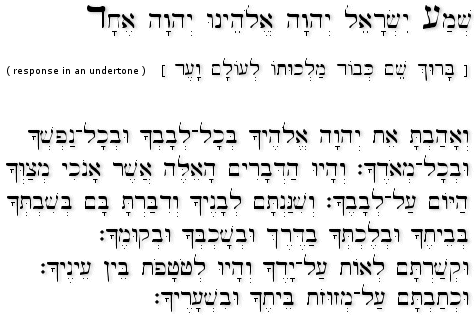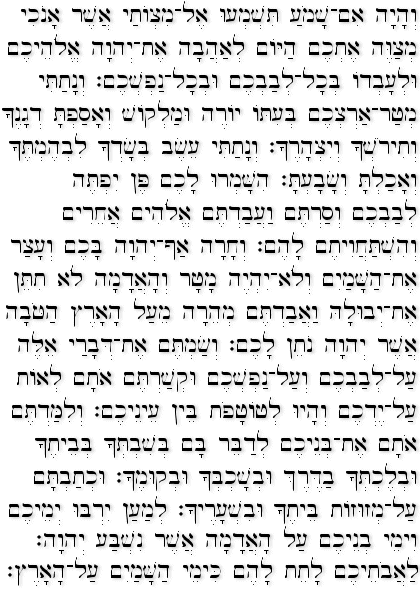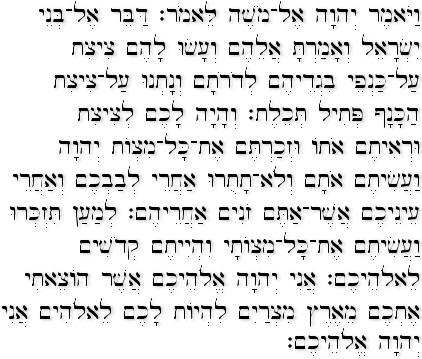 |
|
Transliteration: Shema yisrael Adonai eloheinu Adonai echad. [barukh shem kevod malkhuto le'olam va'ed.] ve'ahavta et Adonai eloheykha bekhol-levavkha u'vekhol nafshekha u'vekhol me'odekha. ve'hayu hadevarim ha'eileh asher anokhi metzavekha haiyom al-levavekha. veshinantam levanekha vedibarta bam beshivtekha beveitekha u'velekhtekha vaderekh u'vshakhbekha u'vkumekha. u'kshartam le'ot al-yadekha vehayu letotafot bein einekha. u'khtavtam al-mezuzot beitekha u'visharekha. |
|
Translation: HEAR, O ISRAEL: The LORD our God, the LORD is one. You shall love the LORD your God with all your heart and with all your soul and with all your might. And these words that I command you today shall be on your heart. You shall teach them diligently to your children, and shall talk of them when you sit in your house, and when you walk by the way, and when you lie down, and when you rise. You shall bind them as a sign on your hand, and they shall be as frontlets between your eyes. You shall write them on the doorposts of your house and on your gates. |
|
Vehayah: the Second Passage |
|
The second part of the Shema is from Deuteronomy 11:13-21, beginning with the word vehaya. It declares the Jew's acceptance of the commandments and stresses the blessings that come through obedience to Adonai and the consequences that come through disobedience. |
|||||||
 |
|||||||
|
Transliteration: Vehayah im-shamoa' tishme'u el-mitzvotai asher anokhi metzaveh etkhem haiyom le'ahavah et-Adonai eloheikhem u'le'avdo b'khol-levavkhem u'vkhol-nafshekhem. venatati metar-artzekhem be'ito yoreh u'malkosh ve'asafta deganekha ve'tiroshkha ve'yitzharekha. venatati eisev b'sadekha livhemtekha v'akhalta vesava'ta. hishameru lakhem pen yifteh levavkhem vesadtem va'avadtem elohim acheirim vehishtachavitem lahem. vecharah af-Adonai bakhem ve'atzar et-tashamayim velo-yiheyeh matar veha'adamah lo titen et-yevulah va'avadtem meharah mei'al ha'aretz hatovah asher Adonai notein lakhem. vesamtem et-devarai eileh al-levavkhem ve'al-nafshekhem uk'shartem otam le'ot al-yedkhem vehayi letotafot bein eineikhem. ve'limadtem otam et-beneikhem ledabeir bam beshivtekha beveitekha uvlekhtekha vaderekh uv'sharkhbekha uv'kumekha. u'khtavtam al-mezuzot beitekha u'vish'arekha. lema'an yirbu yemeikhem yimei beneikhem al ha'adamah asher nishba Adonai. la'avoteikhem lateit lahem kimei hashamayim al-ha'aretz. |
|||||||
|
Translation: AND IF YOU WILL indeed obey my commandments that I command you today, to love the LORD your God, and to serve him with all your heart and with all your soul, he will give the rain for your land in its season, the early rain and the later rain, that you may gather in your grain and your wine and your oil. And he will give grass in your fields for your livestock, and you shall eat and be full. Take care lest your heart be deceived, and you turn aside and serve other gods and worship them; then the anger of the LORD will be kindled against you, and he will shut up the heavens, so that there will be no rain, and the land will yield no fruit, and you will perish quickly off the good land that the LORD is giving you. "You shall therefore lay up these words of mine in your heart and in your soul, and you shall bind them as a sign on your hand, and they shall be as frontlets between your eyes. You shall teach them to your children, talking of them when you are sitting in your house, and when you are walking by the way, and when you lie down, and when you rise. You shall write them on the doorposts of your house and on your gates, that your days and the days of your children may be multiplied in the land that the LORD swore to your fathers to give them, as long as the heavens are above the earth. |
|||||||
|
Yaiyomer: the Third Passage |
|||||||
|
The third part of the Shema is from Numbers 15:37-41 and concerns the use of the tallit, a rectangular prayer shawl with four fringes (called tzitzit). One tzitzit is attached to each corner of the tallit. The reason for wearing the tzitzit is to remind oneself to observe all of the commandments of the Lord: |
|||||||
 |
|||||||
|
Transliteration: Vaiyomer Adonai el-Moshe leimor. dabeir el-benei yisrael ve'amarta aleihem ve'asu lahem tzitzit al-kanfei vigdeihem ledorotam venatnu al-tzitzit hakanad petil tekheilet. vehayah lakhem letzitzit u'ritem oto uz'khartem et-kol-mitzvot Adonai va'asitem otam velo-taturu acharei levavkhem ve'acharei einiekhem asher-atem zonim achareihem. lema'an tizkeru va'asitem el-kol-mitzvotai vihtitem kedoshim leiloheikhem. ani Adonai eloheikhem asher hotzeiti atkhem mei'eretz mitzraim liyot lakhem leilohim ani Adonai eloheikhem. |
|||||||
|
Translation: THE LORD SAID to Moses, "Speak to the people of Israel, and tell them to make tassels on the corners of their garments throughout their generations, and to put a cord of blue on the tassel of each corner. And it shall be a tassel for you to look at and remember all the commandments of the LORD, to do them, not to follow after your own heart and your own eyes, which you are inclined to whore after. So you shall remember and do all my commandments, and be holy to your God. I am the LORD your God, who brought you out of the land of Egypt to be your God: I am the LORD your God." |
|||||||
|
<< Return |
|||||||
|
|
|||||||
